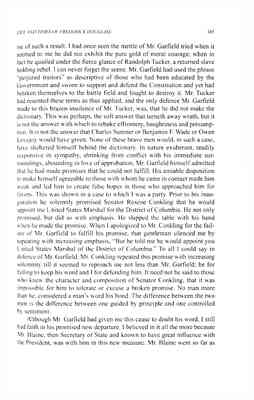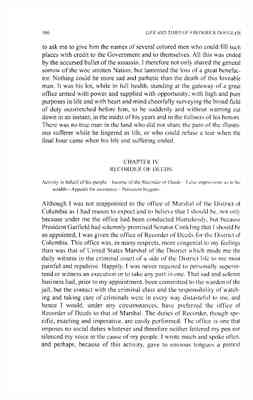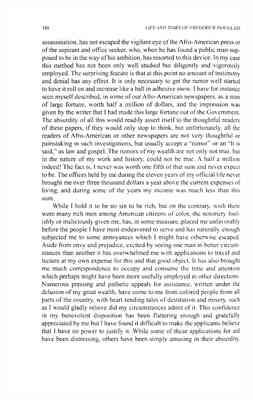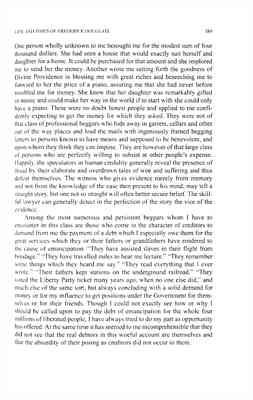Pages
11
LIFE AND TIMES OF FREDERICK DOUGLASS 385
[promise] of such a result. I had once seen the mettle of Mr. Garfield tried when it seemed to me he did not exhibit the pure gold of moral courage; when in fact he quailed under the fierce glance of Randolph Tucker, a returned slave holding rebel. I can never forget the scene. Mr. Garfield had used the phrase "perjured traitors" as descriptive of those who had been educated by the Government and sworn to support and defend the Constitution and yet had betaken themselves to the battle field and fought to destroy it. Mr. Tucker had resented these terms as thus applied, and the only defence Mr. Garfield made to this brazen insolence of Mr. Tucker, was, that he did not make the dictionary. This was perhaps, the soft answer that turneth away wrath, but it is not the answer with which to rebuke effrontery, haughtiness and presumption. It is not the answer that Charles Sumner or Benjamin F. Wade or Owen Lovejoy would have given. None of these brave men would, in such a case, have sheltered himself behind the dictionary. In nature exuberant, readily responsive in sympathy, shrinking from conflict with his immediate surroundings, abounding in love of approbation. Mr. Garfield himself admitted that he had made promises that he could not fulfill. His amiable disposition to make himself agreeable to those with whom he came in contact made him weak and led him to create false hopes in those who approached him for favors. This was shown in a case to which I was a party. Prior to his inauguration he solemnly promised Senator Roscoe Conkling that he would appoint me United States Marshal for the District of Columbia. He not only promised, but did so with emphasis. He slapped the table with his hand when he made the promise. When I apologized to Mr. Conkling for the failure of Mr. Garfield to fulfill his promise, that gentleman silenced me by repeating with increasing emphasis." But he told me he would appoint you United States Marshal of the District of Columbia." To all I could say in defence of Mr. Garfield. Mr. Conkling repeated this promise with increasing solemnity till it seemed to reproach me not less than Mr. Garfield; he for failing to keep his word and I for defending him. It need not be said to those who knew the character and composition of Senator Conkling, that it was impossible for him to tolerate or excuse a broken promise. No man more than he, considered a man's word his bond. The difference between the two men is the difference between one guided by principle and one controlled by sentiment.
Although Mr. Garfield had given me this cause to doubt his word, I still had faith in his promised new departure. I believed in it all the more because Mr. Blaine, then Secretary of State and known to have great influence with the President, was with him in this new measure. Mr. Blaine went so far as
12
386 LIFE AND TIMES OF FREDERICK DOUGLASS
to ask me to give him the names of several colored men who could fill such places with credit to the Government and to themselves. All this was ended by the accursed bullet of the assassin. I therefore not only shared the general sorrow of the woe smitten Nation, but lamented the loss of a great benefactor. Nothing could be more sad and pathetic than the death of this loveable man. It was his lot, while in full health, standing at the gateway of a great office armed with power and supplied with opportunity: with high and pure purposes in life and with heart and mind cheerfully surveying the broad field of duty outstretched before him, to be suddenly and without warning cut down in an instant, in the midst of his years and in the fullness of his honors. There was no true man in the land who did not share the pain of the illustrious sufferer while he lingered in life, or who could refuse a tear when the final hour came when his life and suffering ended.
CHAPTER IV. RECORDER OF DEEDS.
Activity in behalf of his people – Income of the Recorder of Deeds – False impressions as to his wealth – Appeals for assistance – Persistent beggars.
Although I was not reappointed to the office of Marshal of the District of Columbia as I had reason to expect and to believe that I should be, not only because under me the office had been conducted blamelessly, but because President Garfield had solemnly promised Senator Conkling that I should be so appointed, I was given the office of Recorder of Deeds for the District of Columbia. This office was, in many respects, more congenial to my feelings than was that of United States Marshal of the District which made me the daily witness in the criminal court of a side of the District life to me most painful and repulsive. Happily, I was never required to personally superintend or witness an execution or to take any part in one. That sad and solemn business had, prior to my appointment, been committed to the warden of the jail, but the contact with the criminal class and the responsibility of watching and taking care of criminals were in every way distasteful to me, and hence I would, under any circumstances, have preferred the office of Recorder of Deeds to that of Marshal. The duties of Recorder, though specific, exacting and imperative, are easily performed. The office is one that imposes no social duties whatever and therefore neither fettered my pen nor silenced my voice in the cause of my people. I wrote much and spoke often, and perhaps, because of this activity, gave to envious tongues a pretext
13
LIFE AND TIMES OF FREDERICK DOUGLASS 387
against me. I think that I was not, while in this office or in that of Marshal, less outspoken against what I considered the errors of rulers, than while outside of the office. My cause first, midst, last and always, whether in office or out of office, was and is that of the black man; not because he is black, but because he is a man, and a man subjected in this country to peculiar wrongs and hardships.
As in the case of United States Marshal, so in that of Recorder of Deeds, I was the first colored man who held the office, and like all innovations on established usage, my appointment did not meet with the approval of the conservatives and old time rulers of the country, but on the contrary, met with resistance from both these and the press as well as from the street corners. Happily for me the American people possess in large measure a proneness to acquiescence. They readily submit to the "Powers that be" and to the rule or the majority. This sheet anchor of our national stability, prosperity and peace, served me in good stead in this crisis in my career, as indeed it had done in many others.
I held the office of Recorder of Deeds of the District of Columbia for nearly five years. Having, so to speak, broken the ice by giving to the country the example of a colored man at the head of that office, it has become the one special office to which, since that time, colored men have aspired. Much that is sheep-like is illustrated in the colored race and perhaps the same is true in all races. Where one goes the others are apt to follow. The office has, ever since I left it, been sought for and occupied by colored men. In this, if not in anything else. I have opened the gate and led the way upward for the people with whom I am identified. The office of Recorder was far less remunerative: when I held it than it has since become. With the almost wonderful increase of population, after long years of stationary condition due to the existence of slavery, and with the vast improvements in its sanitary conditions, there has come to Washington a surprising activity in the real estate business. As the office of Recorder is supported by fees, and every transfer of property and every Deed of Trust and every Mortgage executed must be recorded, the income of this office has risen to a larger sum than that of any office of the National Government except that of the President of the United States.
In my experience in public life I have learned that there are many ways by which confidence in public men may be undermined and destroyed, and against which they arc comparatively helpless. One of the most successful methods is to start the rumor that a man has made a large fortune out of the Government and is rich. This method of political warfare, I will hardly say
14
388 LIFE AND TIMES OF FREDERICK DOUGLASS
assassination, has not escaped the vigilant eye of the Afro-American press or of the aspirant and office seeker, who, when he has found a public man supposed to be in the way of his ambition, has resorted to this device. In my case this method has not been only well studied but diligently and vigorously employed. The surprising feature is that at this point no amount of testimony and denial has any effect. It is only necessary to get the rumor well started to have it roll on and increase like a ball in adhesive snow. I have for instance seen myself described, in some of our Afro-American newspapers, as a man of large fortune, worth half a million of dollars, and the impression was given by the writer that I had made this large fortune out of the Government. The absurdity of all this would readily assert itself to the thoughtful readers of these papers, if they would only stop to think, but unfortunately, all the readers of Afro-American or other newspapers are not very thoughtful or painstaking in such investigations, but usually accept a "rumor" or an "It is said," as law and gospel. The rumors of my wealth are not only not true, but in the nature of my work and history, could not be true. A half a million indeed! The fact is, I never was worth one fifth of that sum and never expect to be. The offices held by me during the eleven years of my political life never brought me over three thousand dollars a year above the current expenses of living, and during some of the years my income was much less than this sum .
While I hold it to be no sin to be rich. but on the contrary, wish there were many rich men among American citizens of color, the notoriety foolishly or maliciously given me, has, in some measure, placed me unfavorably before the people I have most endeavored to serve and has naturally enough subjected me to some annoyances which I might have otherwise escaped. Aside from envy and prejudice, excited by seeing one man in better circumstances than another it has overwhelmed me with applications to travel and lecture at my own expense for this and that good object. It has also brought me much correspondence to occupy and consume the time and attention which perhaps might have been more usefully employed in other directions. Numerous pressing and pathetic appeals for assistance, written under the delusion of my great wealth, have come to me from colored people from all parts of the country, with heart rending tales of destitution and misery, such as I would gladly relieve did my circumstances admit of it. This confidence in my benevolent disposition has been flattering enough and gratefully appreciated by me but I have found it difficult to make the applicants believe that I have no power to justify it. While some of these applications for aid have been distressing, others have been simply amusing in their absurdity.
15
LIFE AND TIMES OF FREDERICK DOUGLASS 389
One person wholly unknown to me besought me for the modest sum of four thousand dollars. She had seen a house that would exactly suit herself and daughter for a home. It could be purchased for that amount and she implored me to send her the money. Another wrote me setting forth the goodness of Divine Providence in blessing me with great riches and beseeching me to forward to her the price of a piano, assuring me that she had never before troubled me for money. She knew that her daughter was remarkably gifted in music and could make her way in the world if to start with she could only have a piano. These were no doubt honest people and applied to me confidently expecting to get the money for which they asked. They were not of that class or professional beggars who hide away in garrets, cellars and other out of the way places and load the mails with ingeniously framed begging letters to persons known to have means and supposed to be benevolent, and upon whom they think they can impose. They are however of that large class or persons who are perfectly willing to subsist at other people's expense. Happily, the speculators in human credulity generally reveal the presence of fraud by their elaborate and overdrawn tales of woe and suffering and thus defeat themselves. The witness who gives evidence merely from memory and not from the knowledge of the case then present to his mind, may tell a straight story, but one not so straight will often better secure belief. The skillful lawyer can generally detect in the perfection of the story the vice of the evidence.
Among the most numerous and persistent beggars whom I have to encounter in this class are those who come in the character of creditors to demand from me the payment of a debt which I especially owe them for the great services which they or their fathers or grandfathers have rendered to the cause of emancipation. "They have assisted slaves in their flight from bondage." "They have travelled miles to hear me lecture." "They remember some things which they heard me say." "They read everything that I ever wrote." "Their fathers kept stations on the underground railroad." "They voted the Liberty Party ticket many years ago, when no one else did,'' and much else of the same sort, but always concluding with a solid demand for money or for my influence to get positions under the Government for themselves or for their friends. Though I could not exactly see how or why I should he called upon to pay the debt of emancipation for the whole four millions of liberated people, I have always tried to do my part as opportunity has offered. At the same time it has seemed to me incomprehensible that they did not see that the real debtors in this woeful account are themselves and that the absurdity of their posing as creditors did not occur to them.




